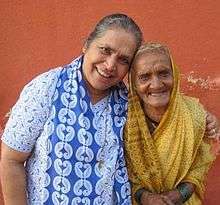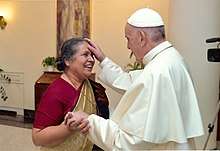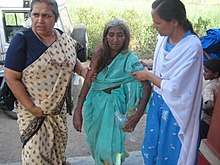Maher (NGO)
Maher (Marathi: My mother's home) is an interfaith and caste-free Indian non-governmental organisation based near Pune with remote homes in Ranchi, Ratnagiri, Miraj and Ernakulam. The objective of the organisation is to provide shelter and support to destitute women and children. It was founded by Sister Lucy Kurien in 1997 in the village Vadhu Budruk.[3]
| Motto | There is always room for one more.[1] |
|---|---|
| Founded | 2 February 1997 by Sister Lucy Kurien in India |
| Type | Non-profit NGO |
| Location |
|
| Services | Homes for children, women and men, self help groups, general outreach, women empowerment |
Members | Current Members: 860 children, 300 women (including 120 mentally ill women), 71 men, 10,000 SHG members through 552 SHGs, 210 employees Total Beneficiaries till date: 38,000+ (approx. numbers)[2] |
| Website | maherashram |
History
The Beginning (1991)
1991, while Sister Lucy was working for the H.O.P.E organisation,[4] a pregnant woman came to her, asking for help. She believed her husband was going to kill her to bring another woman into his house. Sister Lucy couldn't help her, but promised to try and do something for her the following day.
I was brought up in a secure family environment and I was unaware that one night could make such a difference to the life of a woman"; "That very night, her husband, in a drunken rage, set her on tembefire. I actually saw the blazing woman and heard her shrieks of agony. We put the fire out and took her to a hospital but she died of 90 degree burns and with her died the seven-month-old fetus. I was devastated..
— Sister Lucy[5]
After this incident Sister Lucy decided to found Maher, to help women in such a plight. It took almost seven years to get the needed support, but on 2 February 1997 in the small village of Vadhu Budruk, on the outskirts of Pune, the first Maher house opened its doors.
Further Development (1997 - 2017)

Maher began with Sr. Lucy, 1 house, 3 residents, and daunting odds. Today, Maher operates 43 houses served by a loving army of doctors/ social workers/ teachers/ trustees/ business people/ volunteers etc., providing homes for over 1,200 full-time residents (860 children, 300 women including 120 mentally ill women and 71 mentally ill/aged destitute men) in addition to the thousands more reached by community programs such as kindergartens, self-help groups, village libraries, and so on. All are welcome at Maher regardless of religion, gender, caste, color, creed, or social status.
The children of Maher come from the streets and slums, from begging communities, from parents unable to care for them, from other institutions that have rejected them. They come for short or long-term stays, and for as long as they live at Maher they receive schooling, tutoring, excellent nutrition, meditation, artistic programming, and more. They come from tragedy and are met with family, love, and the prospect of a bright future.
The stories brought by the women are as varied as the children. Rural India is an unforgiving place for women facing problems of family violence, unwed pregnancies, widowhood, dowry payment, and the list goes on. With nowhere to go, often women in these situations see no options beyond prostitution or suicide. Arriving seeking refuge, all are welcomed, listened to, and cared for. Each woman is supported individually, whether through reconciliation and reunion with family, self-reliance through job-training or schooling, or jobs within Maher itself. However, for some the trauma of the past is too great. For such men and women suffering from mental illness Maher has two homes, offering medical and psychiatric care.
In addition to helping the victims of abuse and poverty, Maher strives to address the problems that lead to such abuse at a grass-roots level. Community outreach programs impact the lives of thousands in a myriad of ways with Maher's twenty-three current projects.
Over a period of only 20 years, over 38,000 people have been impacted with Maher's aid programs, 43 houses have been built (7 for women, 34 for children and 2 for men) and Maher expanded in other states of India: Jharkhand (2008) and Kerala (2009) . Also the aid for Maher increased considerably. More and more people, mainly from Austria,[6] Germany,[7] the United States and the UK,[8] came to support the project. For her work at Maher, Sister Lucy was honoured with the Nari Shakti Puraskar at the hands of the then President of India, Pranab Mukherjee, DCCIA Award for Excellence in Social Service 2010[9] Global Women's Leadership Award 2011,[10] Paul Harris Fellow, Vanitha Woman of the Year Award among other prominent awards. Maher and Sister Lucy Kurien have featured several times on Indian television, including the popular show Satyamev Jayate hosted by actor Aamir Khan, and also on Vatican Radio. In 2015, Sister Lucy was invited to attend the Clinton Global Initiative.
In May 2017, Maher was granted a "special consultative status" with the United Nations Economic and Social Council (UN-ECOSOC).

Maher founder, Sister Lucy, has had the opportunity to meet with Pope Francis, Indian Prime Minister Narendra Modi and former US President Bill Clinton on different occasions.
Today (from 2017)
In 2017, Maher had its 20th anniversary celebration attended by 15,000 people from 10 countries. Former President of India, Pratibha Patil, chairperson, Lila Poonawalla Foundation, Lila Poonawalla and eminent Buddhist nun Jetsunma Tenzin Palmo attended the event on 5 February 2017 at Maher Vatsalyadham, Avhalwadi, Pune.[11]
In a country and world split by gender, religion, color, and caste, Maher stands as a working model of a society that rejects such divisions. The need is great, but the success of the last 20 years is a promise of great things to come. Dreams for future growth include expanding the work to Calcutta, a new home for those affected by HIV, a permanent residence for elderly and mentally ill men, and a dozen projects more. All who contribute become a part of the Maher family and the integral ingredient in nurturing this necessary work. The energy and love of the leadership and staff knows no bounds; the continued expansion of Maher is limited only by the concurrent growth of awareness and support from the community, both in India and abroad.
Structure
Maher's activities are grouped into different projects - the three main projects are Mamtadham (Marathi: a place of mother's love), Kishoredham (Marathi: a children's place) and Vatsalyadham (Marathi: a place of love). The organization is led by women leaders - the founder Sister Lucy Kurien and the president Hirabegum Mulla.
Mamtadham - A home for battered and destitute women
Under this project Maher, runs homes for destitute women. The main aim of this project is to raise the women's self-esteem and support them in becoming self-sufficient.
Women reeling under different kinds of emotional, psychological, social and financial tensions are welcome under this project. They are from all sections of our community and are given affection and acceptance long denied to them by their kith and kin. Maher had initially planned to work only with the women who had sought refuge at Maher. However, in time it was realized that it was not just the women who were in distress; their children too were the victims of the hard times their mother faced. It was therefore decided to bring in children too within Maher's network. Maher so far has been able to reach out to and touch the lives of more than 3000 women. They came to Maher hoping for some shelter- temporary or for an extended period. Often they are illiterate or have just a smattering of alphabets. Despite these odds, Maher helps them with professional training with a view to making them economically self-reliant. At Maher, these women follow a regular timetable; they work together by helping out in the kitchen, in cleaning the house, working at the training centre. Maher gives courses in different handicrafts like candles, greeting cards, cloth bags and purses in order to give them independence and the possibility to earn money on their own. Many women are later employed by Maher to help with the various projects.[12]

Kishoredham - A home for orphans and children from broken families
Maher works towards the education and well being of every child who joins the Maher family. However, these basic rights are snatched away from most of the children who have come to Maher due to various traumatic situations that blocked their healthy development and growth. These children carry a burden of their past which is for them painful and frustrating in the extreme. For these reasons Maher works towards creating an atmosphere of love and acceptance that is conducive to the emotional and physical growth of these children so that they are enabled to realize their full potential. Till date, approximately 4000 children have gone through this experience at Maher. The Kishordham project incorporates 34 children's homes under its umbrella and currently houses 873 children. More than 90 children are currently pursuing higher education in various fields.
In each home there are 25-30 children and two housemothers, who are with them the whole time. Additionally social workers supervise the homes. The children are sent to school (if possible to an English Medium School) and Maher provides dance, sports and musical activities.

Vatsalyadham - A home for mentally ill, destitute women
This is a home for mentally ill women. These women are often found wandering on the street and need shelter and psychiatric help.[13] Located at ManjariKhurd, Vatsalyadham is a special home for these women, created with an objective to rehabilitate them back into social mainstream. The women are assisted by social workers, nurses and psychiatrists who provide medical and therapeutic services to them. The staff who make up the working force of Vatsalyadham include women who had originally come to Maher in search for help and are now capable of helping other women in need.
Activities are conducted for their betterment including listening to music, playing simple games, practise of various exercises and medical therapy. After some time the Maher staff tries to find out the address of the patients to contact the families. If it seems to be safe to send them home, they are reunited with their families.[14] Regular follow-ups are done to ensure that the women are coping well.
Summary of all Maher projects
| Projects for Women | ||
|---|---|---|
| SN | Name of the Project | Nature of the Project |
| 1 | Mamtadham | Shelter for battered and destitute women |
| 2 | Vatsalyadham | Shelter for mentally disturbed women |
| 3 | Swavalamban | Self-help micro finance groups of village women |
| 4 | Aashai | Shelter and medical care for indigent expectant mothers |
| 5 | Parishram | Vocational training to indigent women |
| 6 | Sukh Sandhya | Shelter to destitute aged women |
| Projects for children, youth and men | ||
| SN | Name of the Project | Nature of the Project |
| 1 | Premalaya | Crèche cum day-care center |
| 2 | Kishoredham | Shelter and education for children from broken homes |
| 3 | Ushalaya | Village kindergartens |
| 4 | Vidyalaya | Study coaching for needy students |
| 5 | Vidyadhan | Opportunities for post-high school education |
| 6 | Gammat Shala | Daycare for the children of brick-kiln workers |
| 7 | Tantragyan | Technical training for older children |
| 8 | Aadhar | Placement for village youth |
| 9 | Kalasagar | Open school for drop-outs |
| 10 | Karunalaya | Home for destitute mentally ill/aged men |
| Projects for general population | ||
| SN | Name of the Project | Nature of the Project |
| 1 | Ekata | Free provisions to poor families |
| 2 | Pragati | Rural outreach programmes |
| 3 | Dnyan Ganga | Village libraries |
| 4 | Swachchhata | Vermiculture pits, Biogas plants & Toilet construction in the villages |
| 5 | Lokmangala | General outreach in times of natural calamities |
| 6 | Adiwasi Kalyan Kendra | Welfare activities for tribals |
| 7 | Karya Mandal | The central administrative office |
Philosophy
Most of Maher's children and women are Hindus, but there are Muslims, Buddhists and Christians too. Maher's emphasis on interfaith is essential in the everyday life, but also at special occasions. In November 2012, Maher celebrated the Hindu festival of light - Diwali - in a special way: people from different religions recited verses and prayed together.[15] In order to promote peace, harmony and brotherhood, Maher celebrates all the major festivals of the different religions in India. Maher also takes steps to follow the idea of sustainability: In March 2013 the organization decided to play Holi with natural colours[16] instead of using the common synthetic colours.
References
- "About Maher - Introduction". Maher. Retrieved 17 June 2013.
- "About Maher". Maher. Retrieved 16 May 2016.
- Janjali, Arwa (Sep 9, 2011). "Giving them love when they need it most". Sakaal Times. Retrieved June 19, 2013.
- "Friends of H.O.P.E". Human Organization for Pioneering in Education. Retrieved 24 June 2013.
- "Maher History". Maher. Retrieved 16 May 2016.
- "About Maher". Vienna International School. Retrieved 25 June 2013.
- "German: Friends of Maher(registered association)". Catholic Church Liebfrauen. Retrieved 25 June 2013.
- Kulkarni, Pranav (May 7, 2008). "From Bhima to Thames, orphans from Maher captured UK hearts". The Indian Express. Retrieved June 25, 2013.
- Express News Service (Oct 12, 2010). "Deccan Chamber looks for ties abroad". The Indian Express. Retrieved June 24, 2013.
- Mascarenhas, Anuradha (Feb 28, 2013). "Maher away from home for abandoned mental patients". The Indian Express. Retrieved June 24, 2013.
- "Celebrations at Maher | Sakal Times - NewsDog". Retrieved 2017-11-20.
- "Ray of Light in India". Vision Magazine.
- "Maher – House Vatsalyadham". De-Addiction Centres.in. Retrieved June 26, 2013.
- Dutta, Dr. Piyali. "A summary of summer internship case studies".
- Udyawar, Gayathri (Nov 12, 2012). "Diwali spreads cheer among city orphanges". The Indian Express. Retrieved June 25, 2013.
- Shinde, Swati (Mar 22, 2013). "NGO to celebrate Holi with natural colours". The Times Of India. Retrieved June 25, 2013.
Further reading
- Dr. William Keepin, Ph.D.; Cynthia Brix (2009). Women Healing Women: A Model of Hope for Oppressed Women Everywhere. Hohm Press. ISBN 1890772887.
- Maher, a roof over the heads of destitute women & children, 2011 interview with Sister Lucy by Bhagyashree Kulthe
- Ray of Light in India: A Conversation with Sister Lucy Kurien, 2010 interview with Sister Lucy by Elyssa Paige
- The Season Of Blossom, The story of Savita Ashok Tribhuvan (Article by Devjani Roy)
- The Website of Maher Ashram NGO, Read more about Maher